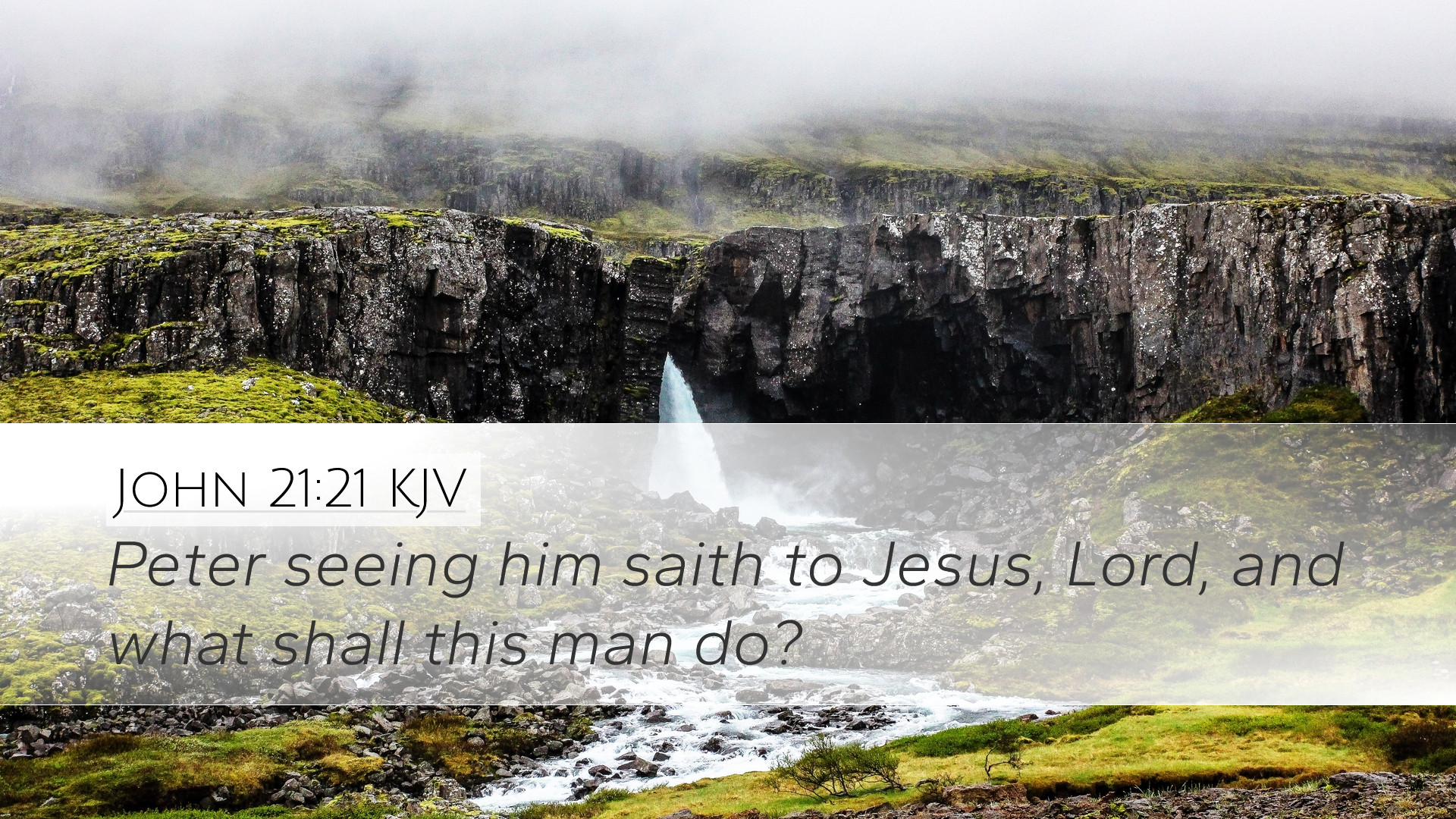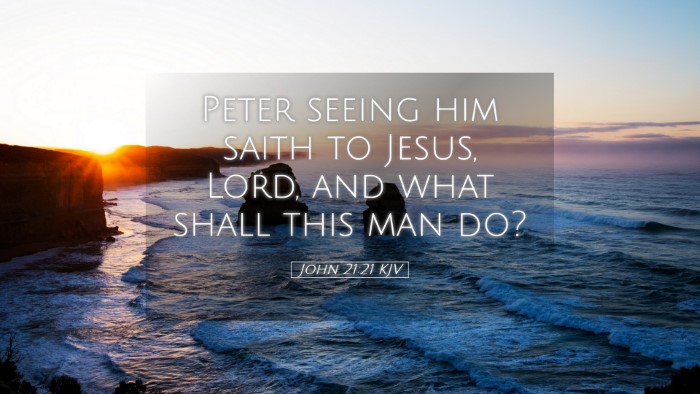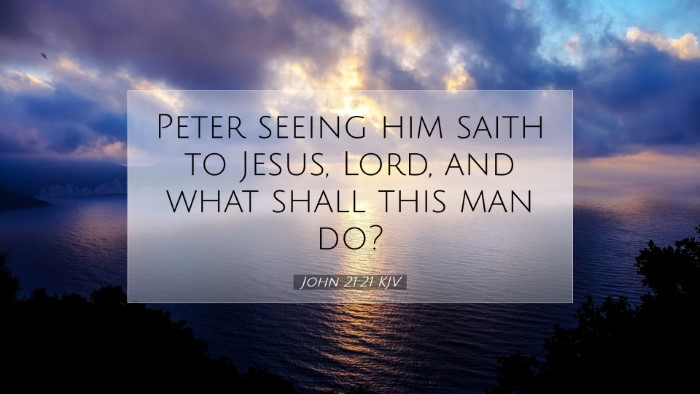Old Testament
Genesis Exodus Leviticus Numbers Deuteronomy Joshua Judges Ruth 1 Samuel 2 Samuel 1 Kings 2 Kings 1 Chronicles 2 Chronicles Ezra Nehemiah Esther Job Psalms Proverbs Ecclesiastes Song of Solomon Isaiah Jeremiah Lamentations Ezekiel Daniel Hosea Joel Amos Obadiah Jonah Micah Nahum Habakkuk Zephaniah Haggai Zechariah MalachiJohn 21:21
John 21:21 KJV
Peter seeing him saith to Jesus, Lord, and what shall this man do?
John 21:21 Bible Commentary
Commentary on John 21:21
Verse Reference: John 21:21
In this verse, we encounter a pivotal moment post-resurrection where Peter turns to Jesus and inquires about the fate of John. This inquiry opens up a line of deep theological reflection regarding discipleship, the nature of God's calling, and the comparison among apostles.
Contextual Analysis
The passage occurs after Jesus' resurrection and emphasizes restoration, particularly of Peter after his denials. In this context, Jesus engages Peter in a personal dialogue, reinstating him before the others. Such a dynamic presents a rich backdrop for understanding John 21:21.
Insights from Public Domain Commentaries
Matthew Henry's Commentary
Matthew Henry notes that Peter's question to Jesus reflects a common human curiosity about the destinies of others. He writes, "Peter, being restored, and setting about his work, turns his eye upon John, and asks, 'What shall this man do?'" This exemplifies how leaders often look around to see what others will face; however, Jesus' reply redirects Peter's focus back to his own calling.
Henry emphasizes the danger of comparison in the spiritual life, underscoring that each disciple has a unique calling: "Follow thou me." This directive indicates that disciples must prioritize their personal journey with Christ over the circumstances of others.
Albert Barnes' Commentary
Albert Barnes elaborates on the significance of Peter's question, highlighting the underlying implication of rivalry and concern among the apostles. Barnes states, "It was natural for Peter to ask of John, Who was so closely associated with him, what would be his destiny." Yet, Jesus’ response underscores God's sovereignty and individual plans for each disciple's life and ministry.
Barnes further points out that Christ's words reflect an important theological truth: "What is that to thee? Follow thou me." This proclamation asserts that the disciples should concentrate on following Christ and not become entangled in divine secrets intended for others. It teaches the lesson that one's spiritual path should not be governed by the paths of others.
Adam Clarke's Commentary
Adam Clarke offers a detailed commentary on Peter’s inquiry, noting that it reflects a certain anxiety regarding John’s fate amid the anticipated trials awaiting the apostles. Clarke writes, "Peter had known that his own path would be one of suffering, and he desires to know if John's would be similar."
In his exegesis, Clarke makes an essential observation concerning the implications of Jesus' answer. He argues, "The Lord's reply indicates that each disciple is accountable for their own faithfulness and that they should not concern themselves with the destinies of others." This captures the individual responsibility each believer carries in their relationship with the Lord.
Theological Implications
The exchange highlights core topics in Christian discipleship, such as:
- Individual Calling: Each disciple is uniquely called, and it is crucial to focus on personal obedience to Christ.
- Discipleship Dynamics: The tension between following Christ and caring about others' paths can lead to confusion; thus, Jesus prioritizes individual following over comparison.
- Trust in God's Sovereignty: God has a tailor-made plan for each believer, and it is not for us to dictate or question His will for others.
Pastoral Applications
This passage serves a strategic role in pastoral ministry. Here are some practical applications:
- Encouragement for Leaders: Pastors should remind their congregations to focus on their journey with Christ rather than measuring their spiritual growth against others.
- Handling Comparison: Teach the necessity of personal discipleship and encourage members to embrace their unique calling, avoiding envy or rivalry.
- Reassurance in Trials: Like Peter, believers may be anxious about their future; a reminder that Jesus knows our paths can alleviate fears.
Conclusion
John 21:21 serves not only as a narrative snapshot of Peter's curiosity about John but also as a profound lesson on the essence of discipleship. Through the insights from Matthew Henry, Albert Barnes, and Adam Clarke, we understand the importance of focusing on our journey with Christ, the individual nature of God's call on our lives, and the beauty of walking in obedience without comparison to others.


